Report says Victoria Police fail to care for members’ mental health
UPDATE: VICTORIA Police has vowed to work with the State Government to try to stem a surge in the number of cops committing suicide and taking extended stress leave.
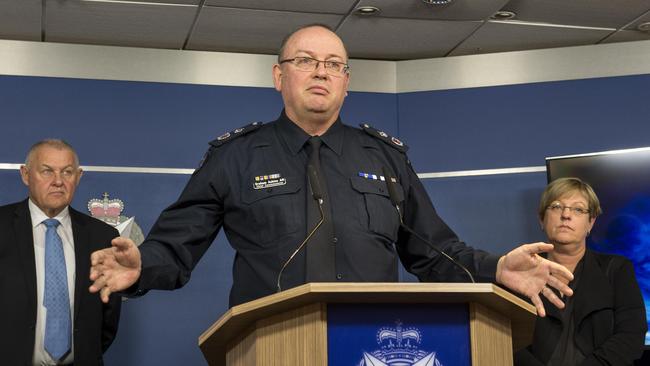
Law & Order
Don't miss out on the headlines from Law & Order. Followed categories will be added to My News.
THE police union and the State Government today joined forces with Victoria Police in a joint bid to cut the number of officers committing suicide or going on extended sick leave.
They did so following the release of an independent report which criticised the way the force handles the mental health of its 18,000 employees.
Chief Commissioner Graham Ashton, Police Minister Lisa Neville and Police Association secretary Ron Iddles today stood side by side at a press conference and vowed to work together to fix every problem identified in the report.
“We are 100 per cent behind the Victoria Police in implementing the recommendations in this report,” Ms Neville said.
“I know this will make this organisation stronger.”
Mr Ashton said he was committed to adopting all 39 recommendations in the report.
Sen-Sergeant Iddles today congratulated Mr Ashton for ordering the review which produced the report and said the association would do all it could to help get every recommendations implemented.
“Currently we have around 23 members a month who have a claim accepted,” he said.
“I know there are many members who are out there suffering silently.
“I am aware of a website where there are over 500 members who interact daily and many of those members haven’t come forward.”
Sen-Sgt Iddles today appealed to those members to come forward and report their mental health problems.
He said he was confident that under the leadership of Mr Ashton that those members would be treated fairly
“Change must come from the top and Graham has instigated change and I think Graham would support those who come forward.
“The challenge for management is to inspire trust in the membership to come forward and disclose and if you do come forward and disclose, there is no adverse effect on your employment.
“If we don’t get those two key points right then I don’t see us moving forward.”
The press conference followed the Herald Sun today revealing Victoria Police is taking urgent action to try to stem a surge in the number of its members committing suicide or taking extended stress leave.
More than 40 serving Victoria Police members have committed suicide since 1990 — three of them this year — and an unknown number of retired officers have also killed themselves.
And at least 200 officers a year are taking long-term sick leave as a result of mental health problems.
The force is tackling the appalling suicide and stress situation after an independent review ordered by Mr Ashton criticised the way it handles mental health issues.
“The litmus test for a mentally health workplace is that if frontline employees are asked, they will state they are confident that if they or a colleague developed a mental health problem they would be well supported in the workplace,” the review’s report said.
“This is clearly not the case now across Victoria Police, other than some notable work group exceptions.”
Review leader Dr Peter Cotton said too many Victoria Police managers adopted a harmful “suck it up Princess” attitude when those they were in charge of came to them with mental health problems and other difficulties.
“Some officers also have a fear that if they put their hands up then they might be taken off operational duties and not get back to them,” he said.
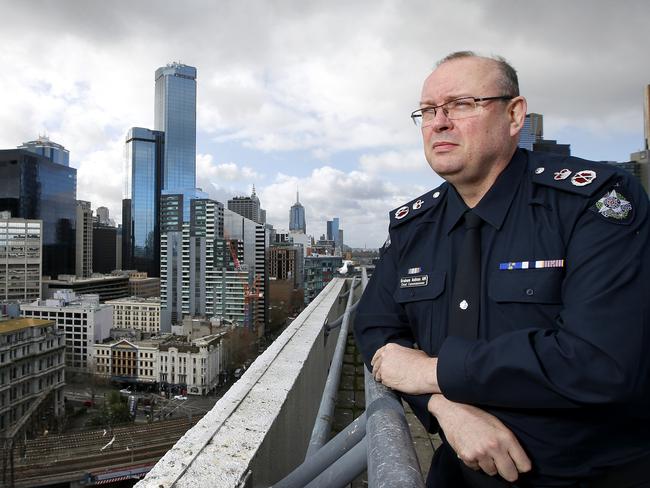
“But the paradox is the earlier they put their hands up the quicker and more likely they will actually be to get back to operational duties.”
Mr Ashton said the disturbing findings left him in no doubt Victoria Police had a lot of work to do to fix the problem — but vowed to do whatever it takes to do so.
“As an organisation we must fundamentally change the way we view mental health,” he said.
The report on the review’s findings also revealed:
SUBSTANCE abuse, depression and anxiety disorders are just as prevalent among officers as post-traumatic stress disorder.
MUCH more help needs to be given to members of the sexual offence and child abuse investigation teams as exposure to sickening child exploitation material has left some officers with permanent psychological scars.
POLICE are reluctant to seek help as a consequence of the widespread and entrenched stigma about mental health in the force as well as sufferers justifiably fearing if they report their problem it will adversely affect their career.
THE force’s psychology and welfare services are significantly under resourced to the point of compromising their effectiveness.
THERE is an urgent need for Victoria Police to provide its employees with early access to psychiatrists and clinical psychologists.
WHILE there is always tension in organisations between wellbeing and performance imperatives, the wellbeing side of the equation in Victoria Police appears to be increasingly compromised.
VICTORIA Police currently has a relatively low level of mental health literacy and there is an urgent need to implement an organisation-wide mental health literacy program.
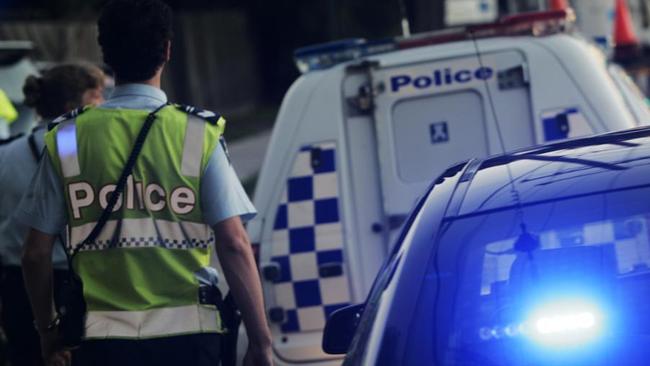
The review was undertaken by a team of independent experts, including Dr Cotton, who is a clinical and organisational psychologist, Peninsula Health boss Nancy Hogan, retired Victoria Police superintendent Peter Bull and researcher Maryanne Lynch.
Its key recommendations are to:
IMPLEMENT a far-reaching mental health literacy program to improve understanding and reduce the stigma of mental health across the organisation.
DEVELOP a people-orientated leadership culture change program to increase managers’ accountability for the wellbeing of employees.
INCREASE resourcing to existing support services and programs.
IMPLEMENT a more comprehensive approach to managing employee mental health across the career lifespan, from recruitment right through to retirement.
Establishing the review was one of the first things Mr Ashton did after becoming Chief Commissioner.
He revealed to the Herald Sun then that he was so concerned about the disturbing number of police suicides that he had ordered a comprehensive investigation into what could be done to improve the wellbeing of his officers.
“Out of that review I will get recommendations as to how I can improve Victoria Police’s policies and management of both post-traumatic stress disorder and the saving of police from suicides,” he told the Herald Sun in September 2015.
Mr Ashton has now promised to adopt all of the review’s 39 recommendations.
“Although the review acknowledges that we have some way to go in improving employee wellbeing and reducing mental health risk, it highlights the good work that our internal health and support services have been doing in this area for some time now,” Mr Ashton said.
“Policing can be a tough job. It’s high stakes, highly scrutinised and very busy.
“In serving the community, our employees are exposed to disturbing and distressing things that the average person rarely sees or experiences.

“This repeat exposure among other factors can impact on our employees’ mental health.
“The mental health and wellbeing of our employees is absolutely paramount. We commissioned this review to learn how we can better protect and support those who protect the community.
“I am heartened by the authors’ strong belief that if we enact the plan laid out for us, we can significantly improve the wellbeing of our entire organisation.
“But the findings leave no doubt that we have a lot of work to do. As an organisation we must fundamentally change the way we view mental health.
“We need to build a culture that better understands mental health. A culture in which our employees feel safe to ask for help without fear of judgment or prejudice.
“I am determined to ensure that Victoria Police is an inclusive, supportive and safe organisation for all.”
The review recommended all retiring Victoria Police employees should undertake an exit interview and mental health screening assessment.
More than 30 retired members were interviewed during the review process.
“There were ample indications, above and beyond allowing for personal axes to grind, that many of these former members were genuinely struggling with mental health-related issues linked with their employment,” the review’s report said.
“These issues included depression, social isolation, relationship and family difficulties, substance misuse, difficulties engaging with any local community based involvements and grappling with suicidal ideation and intrusive recollections of operational incident experiences.
“Some of these former employees have chronic mental health conditions and have established treatment relationships with health service providers outside of Victoria Police.”
Retired detective Mark Wylie’s suicide was just one of many that led to Victoria Police setting up the review.
The former armed robbery squad cop became the latest victim of the Russell St bombing when he took his own life in July 2014.
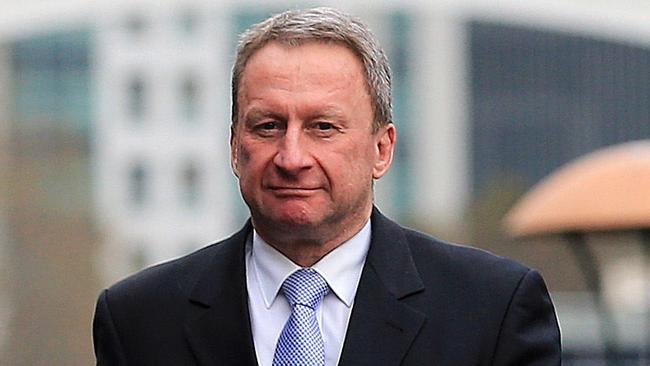
He nearly died in 1986 when he was shot through the chest during a gunbattle while raiding the Kallista home of bombing suspect Peter Reed.
There were not enough ballistic vests available to give one to each member of the raiding party.
The then detective sergeant Wylie was among those not provided with a vest.
He came face to face with Reed, who fired off four shots from his. 45 revolver.
While Det-Sgt Wylie recovered from the physical injuries, the mental trauma of being shot continued to haunt him to the end.
Victoria Police Commander Shane Cole yesterday said the force was about to dramatically increase the number and type of support services available to its employees, as recommended by the review.
He the intention was that every retired officer would have the same access to the improved services as serving members.
“Whether you are serving or not, you come to us for help — you get that help,” Commander Cole said.
He said Victoria Police recognised it was currently far too hard for its employees to successfully make insurance claims for mental health problems through WorkSafe.
“Victoria Police and the insurer actually can’t change the scheme, but we can attempt to influence,” Commander Cole said.
“The scheme is not, in our minds, set up for mental health issues. It’s set up for physical injuries in the workplace.
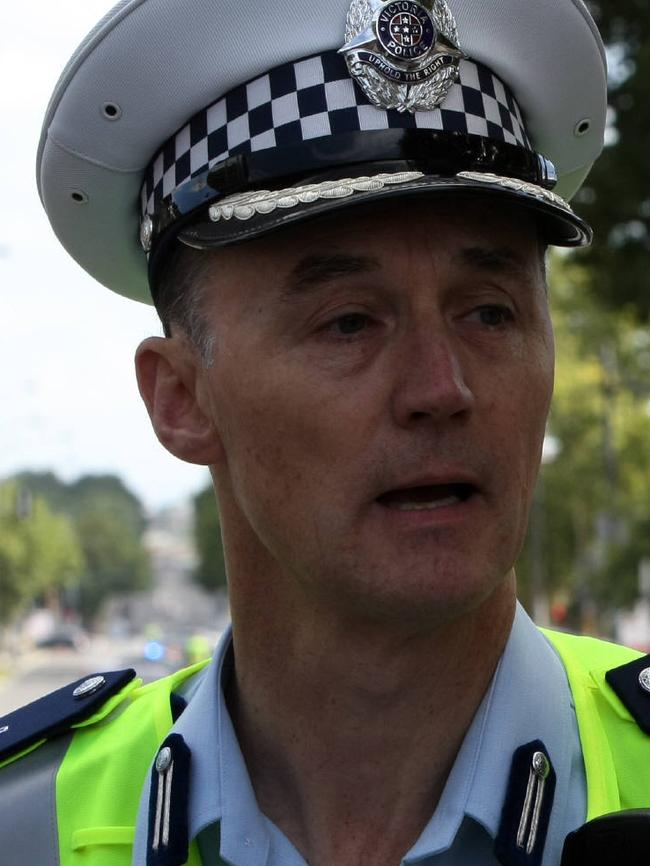
“We need the scheme to actually make it easier for people with mental health issues to get a claim up.”
The review team encountered a number of Victoria Police managers who seemed not only disinterested, but also actively disengaged from arranging return to work programs for officers who had suffered mental health problems.
One senior sergeant said: “There’s nothing wrong with him, he’s not interested in working. I’d prefer to leave him at home rather than bring him back.”
A 28-year Victoria Police employee said: “When I met with my Inspector and the WorkCover person, the Inspector spent the meeting drawing on his coffee cup and then said ‘perhaps you should find another job’. The WorkCover person rang the next day and apologised.”
Another long-serving officer who returned to work after stress leave said: “I was given a spot next to the photocopier on my own so that I wouldn’t have to interact. I am a leper.”
Another disturbing trend highlighted in the report was the reluctance of senior officers to sympathetically or professionally handle lower ranked members with mental health and other problems.
A Sergeant told the review team: “The fact that I had a gun held to my head was not the issue; it’s the fact that I was called ‘ridiculous’ by a superior who has known me for 15 years.”
Another Sergeant said: “My very first job was the death of a child. My Sergeant moved the box of tissues away from me and told me that I needed to suck it up.”
A 28-year veteran of the force said: “If two people went for the same job and you’ve had stress leave, you won’t be the person selected as they’ll think this person is not as good or might fall over.”
